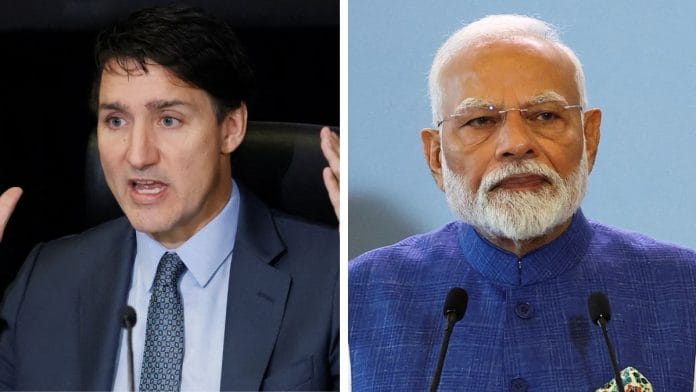Thank you dear subscribers, we are overwhelmed with your response.
Your Turn is a unique section from ThePrint featuring points of view from its subscribers. If you are a subscriber, have a point of view, please send it to us. If not, do subscribe here: https://theprint.in/subscribe/
The Canadian government’s refusal to check the anti-India activities of Khalistan groups has led to an unprecedented diplomatic crisis in India-Canada relations. The crisis unfolded after Justin Trudeau’s Liberal Party-led government, which enjoys considerable support from the Sikh diaspora, ignored India’s call for action into attacks against Hindu temples and Indian mission in Canada.
As ridiculous as it may seem, Canadian nationals are “fighting” for a separate state in India. The best course for India was to ignore these tantrums by a minuscule number of the minority Sikhs in Canada. But behind the veneer of these activities’ attempts are being made to uostage the democratic processes in India by a concerted act from the West especially the USA. Matters came to a head when Hardeep Singh Nijjar, a Canadian Sikh involved with the Khalistan movement. Nijjar was shot and killed in the parking lot of a Sikh temple (Gurdwara) in British Columbia. On 18 September 2023, Canadian Prime Minister Justin Trudeau stated that Canadian intelligence agencies were “pursuing credible allegations of a potential link” between Indian government agents and the assassination of Nijjar.
Canada’s past political tango with Terrorists
Joseph Philippe Pierre Yves Elliott Trudeau (father of Justin Trudeau) was the prime minister of Canada during the bombing of an Air India flight on 23 June 1985. After the bombing, the Canadian government refused to cooperate as Justin’s father, Pierre Trudeau, refused to extradite the mastermind Talwinder Singh Parmar. On the plea though being a member of the commonwealth, did not recognise the sovereignty of the Queen who was Canada’s sovereign.
Present
Domestically battered by rising inflation, unaffordable housing, and surging unemployment, Justin Trudeau’s present Canadian minority government, propped up by a Khalistan sympathetic party is increasingly out of step with a public eager for change. On the international stage, tensions with India over the killing of Sikh separatist (criminal and terrorist) Hardeep Singh Nijjar (who had a portrait of Parmar displayed in his office) have plunged diplomatic relations into deep uncertainty.
These dual crises—one at home, the other abroad—have pushed Trudeau’s leadership to the brink, sparking debate about his motives, methods, and future.
Possible aim: Canada
At the heart of this crisis is the question: Is Trudeau’s handling of the Nijjar case a pursuit of justice or a calculated political move? A déjà vu, like his father handling the Kanishka Bombing). Justin’s critics argue that the latter is true, pointing out that his leadership has suffered a dramatic fall in approval ratings over the past year, and with a federal election looming next October, the stakes have never been higher.
- The Trudeau government Canada is naturing the Khalistan movement for political reasons.
- The West (the USA) is playing along to keep India in “check” in order to get a government change in India which will be subservient to it and blindly tow its line. A game the USA has traditionally played with many nations in the past, the latest being with Bangladesh in India’s neighborhood.
Possible aim: India
The Khalistan movement is absolutely nonexistent in India. Then what does India fear from a group of a couple of thousand Sikhs (almost all of them Canadian citizens) in Canada shouting hoarse and indulging in vandalism on the Khalistan issue?
Firstly, one may argue that in the name of Khalistan some radicalized Sikhs are motivated by this group to cause internal turmoil in India for political and economic reasons – like their alleged involvement in the Farmers agitation in India. Also, India may be vary of what turn it may take in the future, with the connivance of the Canadian administration and the USA playing an indirect role to its advantage. Almost every family in the Punjab in India has a member in Canada – emigrated or awaiting emigration.
Secondly, India may be using this as yet innocuous Khalistan supporters’ threatening rhetoric and local belligerence to hit back at the West and expose their hypocrisy in dealing with democracy, free speech and their practiced double standards in dealing with developing countries and nations of the South. The question is whether India is punching above its weight? The USA with a weakening standing as a leader, its standing in the world is definitely vulnerable and down though not out. Strategically, conveying a message of its vulnerability now may be beneficial though fraught with some danger. Without dare nothing can be achieved.
Possible outcome:
I see only one outcome. After a brief period of hiccups, India will be on top especially after regime changes in the USA and in Canada. The blatant political play in Canada and the hypocrisy of the West (the USA) are all too evident. The “West” is not as popular anymore even in the West.
These pieces are being published as they have been received – they have not been edited/fact-checked by ThePrint.


